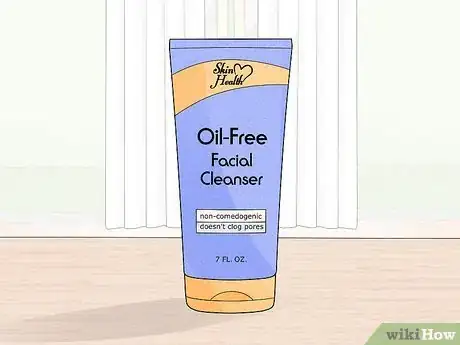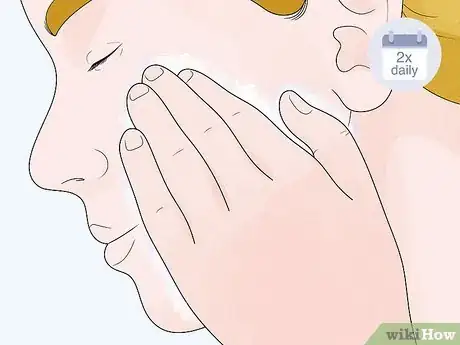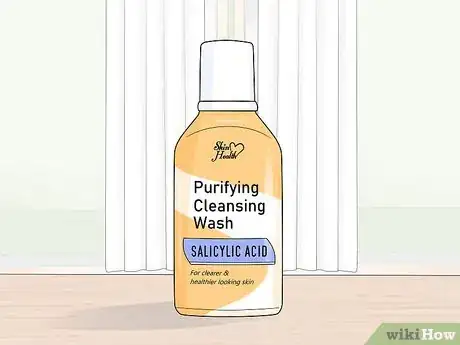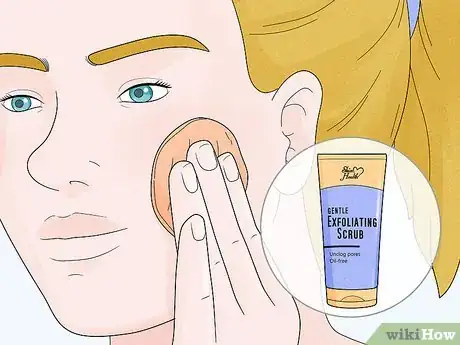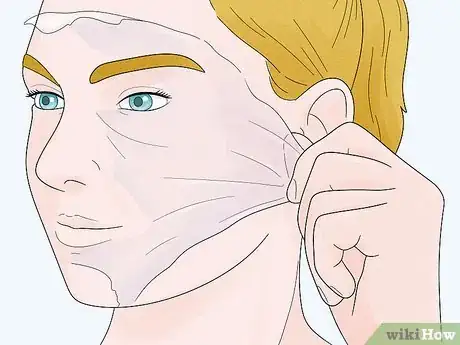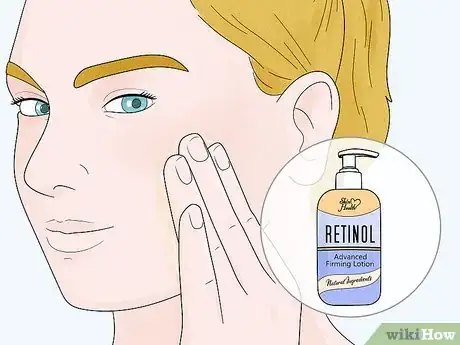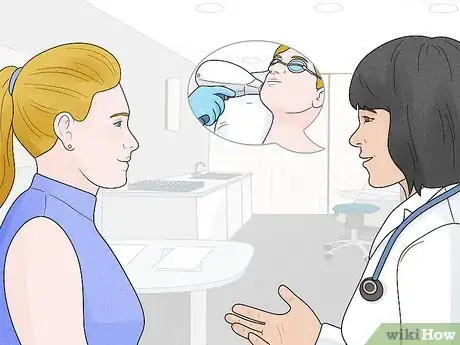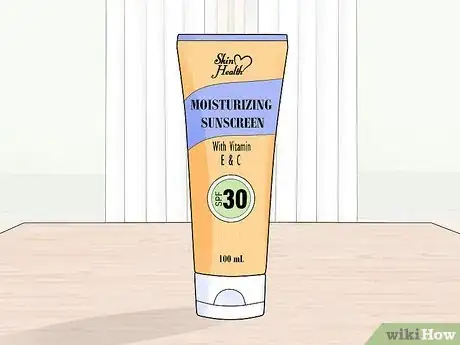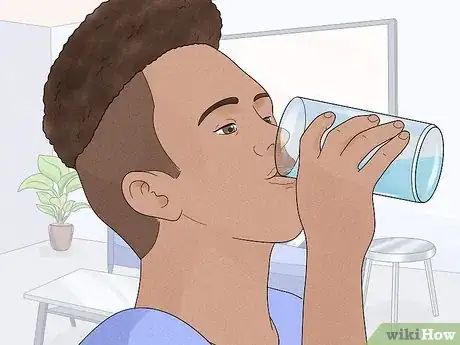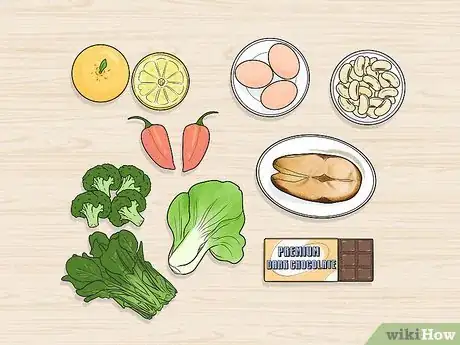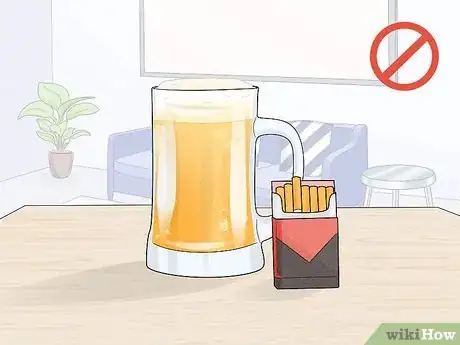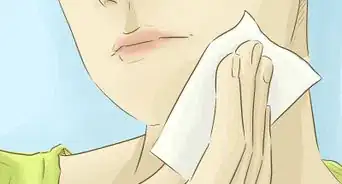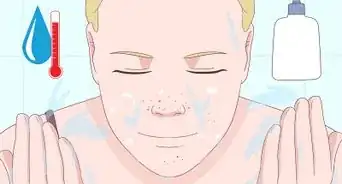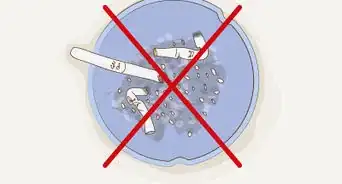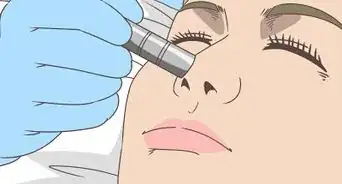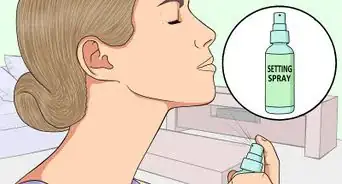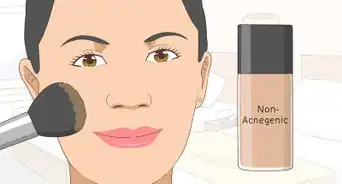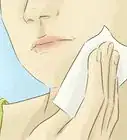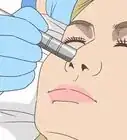This article was co-authored by Margareth Pierre-Louis, MD and by wikiHow staff writer, Megaera Lorenz, PhD. Dr. Margareth Pierre-Louis is a board certified Dermatologist and Dermatopathologist, Physician Entrepreneur, and the Founder of Twin Cities Dermatology Center and Equation Skin Care in Minneapolis, Minnesota. Twin Cities Dermatology Center is a comprehensive dermatology clinic treating patients of all ages through clinical dermatology, cosmetic dermatology, and telemedicine. Equation Skin Care was created to provide the best in evidence-based, natural skin care products. Dr. Pierre-Louis earned a BS in Biology and an MBA from Duke University, an MD from the University of North Carolina at Chapel Hill, completed a residency in dermatology at the University of Minnesota, and completed a dermatopathology fellowship at Washington University in St Louis. Dr. Pierre-Louis is board certified in dermatology, cutaneous surgery, and dermatopathology by the American Boards of Dermatology and Pathology.
There are 21 references cited in this article, which can be found at the bottom of the page.
This article has been viewed 507,955 times.
Enlarged pores are a fact of life for some, like breakups and taxes. But just because it's a fact of life doesn't mean you can't do something about it! While it's not technically possible to permanently reduce the size of pores, you can make them look smaller by taking proper care of your skin.
Steps
Using Pore-Minimizing Skincare Products
-
1Use oil-free skincare products to prevent clogged pores. Oily skincare products can clog up your pores and make them look bigger. To keep your pores clear and let your skin breathe easy, stick to products that are labeled “oil-free” or “non-comedogenic” (meaning they won’t clog your pores).[1] Your skin will thank you!
- Check the label on anything you put on your face, including cleansers, moisturizers, makeup, and sunscreen.
-
2Wash your face twice a day to cleanse your pores. Wash your face every morning and evening to cleanse your skin and remove excess dirt, oils, sweat, and makeup. All that gunk can clog up and irritate your pores. Choose a gentle, oil-free cleanser and massage it on with your fingertips. When you’re done, rinse it off with lukewarm water, which is less irritating than hot water.[2]
- Be kind to your skin when you wash it! Don’t scrub your face, which can irritate your skin and make your pores look bigger. Instead, lightly rub the cleanser over your skin with your fingers.[3]
- Look for a cleanser that’s free of harsh perfumes, dyes, or drying additives, such as alcohol.
- Clean your face any time it’s especially dirty or sweaty, too.
Advertisement -
3Try cleansers with salicylic acid if you have acne. If your skin is acne-prone, your pores might look big because they’re clogged and inflamed. Look for cleansers with salicylic acid, which can help clean out your pores and clear up those annoying pimples and blackheads.[4]
- If these cleansers dry out or irritate your skin, alternate between using a gentle, oil-free cleanser in the morning and a salicylic acid cleanser in the evening.
- Stubborn acne can be frustrating, but there are other treatments out there if over-the-counter medications don’t work. Talk to your doctor or see a dermatologist if you have severe acne that doesn’t respond to salicylic acid.[5]
-
4Exfoliate your skin gently to even it and reduce pores. When you exfoliate, you gently scrub away dead skin and set-in dirt, which can irritate your pores.[6] Use a soft washcloth or a mild exfoliating scrub to very lightly buff the surface of your face for about 30 seconds. Rinse your skin with lukewarm water when you’re done.[7]
- Be gentle with your skin! If you’re using an exfoliating scrub, don’t push hard or scrub. Smooth the exfoliant over your skin using light, circular movements with your fingertips or a soft sponge or brush.
- Some dermatologists recommend exfoliating as often as once a day.[8] However, everyone’s skin is different. Talk to your doctor or dermatologist about how often you should exfoliate.
-
5Look into chemical peels for deeper exfoliation. Chemical peels provide stronger exfoliation, so give them a try if regular exfoliants don’t help with your pores.[9] Try a gentle chemical exfoliant at home or see your dermatologist for a more intensive treatment. A dermatologist can help you decide which option is best for your skin.[10]
- Tretinoin is a common chemical exfoliant. It's a retinoid, meaning it's related to vitamin A. It's prescription only, so you'll have to visit a doctor to get it.
- Alpha hydroxy acids (AHAs) are another class of chemical exfoliant. You can buy AHAs in the store and used them at home to get professional-level results. Look for AHAs that are glycolic acid-based.
- Beta hydroxy acids (BHAs) are helpful, too. BHAs are oil-soluble, whereas AHAs aren't, meaning they can penetrate deep into oily skin and exfoliate from the inside out. BHAs are suitable for people with especially acne-prone skin.[11]
-
6Apply a retinol lotion to reduce oil and firm up your skin. Retinol, retinoic acid, and other retinoids are all forms of skin-friendly vitamin A.[12] After washing your face in the evening, smooth on a lotion containing one of these nourishing ingredients to firm up your skin, reduce pore-clogging oils, and tackle inflammation that might be making your pores look bigger.[13]
- These products can be a little harsh. If retinoids irritate your skin, wait 30 minutes after washing your face to apply them.
- Don’t use any retinoid product if you’re pregnant or breastfeeding, since it could harm your baby.
-
7Talk to your doctor about skin-firming treatments. As you get older, your skin will naturally lose some elasticity. Once your skin begins sagging, your pores will get a lot more obvious. While this can be frustrating, there are some treatment options out there! Ask your doctor for advice, since the right treatment for you will depend on your overall health and what skin type you have. They might recommend:[14]
- Skin-firming serums, creams, or lotions, which will subtly perk up your skin. Look for skin-firming creams that have retinoids in them, since these are the most effective. If your skin is dry, moisturize regularly to temporarily plump up your skin and minimize the look of fine lines and pores.
- Non-surgical lifting and tightening procedures, such as laser, ultrasound, or radiofrequency treatments.
Protecting Your Skin with Lifestyle Changes
-
1Protect your skin from damage with sunscreen. Sun damage makes your skin sag, which exaggerates the size of your pores.[15] To protect your skin from those harsh rays, wear an oil-free, broad-spectrum sunscreen with an SPF of at least 30 when you plan on spending lots of time outside. Reapply your sunscreen at least every 2 hours, or more often if you’re wet or sweaty.[16]
- Put on sunscreen even if it’s cold or cloudy out. You may not be able to see the sun, but you can still get a sunburn!
- Avoid tanning and sunbathing, which can prematurely age your skin and make your pores look bigger.
- Give yourself extra protection by wearing a hat, sunglasses, and clothes that cover most of your skin.
-
2Drink plenty of water to keep your skin firm and hydrated. Dehydrated skin can lose its resilience and become dry, wrinkled, or saggy.[17] Since loss of elasticity can make your pores more obvious, it’s important to ensure that your skin gets plenty of water. Drink at least 8 glasses of water a day to keep your skin healthy and happy.
- It’s not clear that drinking water can directly improve the look of your skin, but it definitely doesn’t hurt! It will also improve your overall health.
-
3Eat a diet rich in antioxidants to slow skin aging. Foods containing antioxidants may slow down your skin’s natural aging process, making it look firmer and less saggy.[18] Having firmer, more youthful skin will help your pores look smaller.[19] To give your skin a boost, eat a balanced diet and lots of nourishing foods that contain:
- Vitamin C. You can get vitamin C from fruits (especially citrus, berries, and melons), leafy green veggies, tomatoes, and green and red peppers.[20]
- Vitamin E. This vitamin is present in nuts, seeds, leafy greens, and some fortified foods (like breakfast cereals).[21]
- Vitamin A. Get this skin-friendly vitamin from eggs, meat, fortified milk or cereal, and red or orange fruits and vegetables (like pumpkins, sweet potatoes, or carrots).[22]
- Vitamin D. Chow down on fatty fish (like salmon or trout), egg yolks, mushrooms, and fortified milk or cereal to get this vitamin.[23]
- Polyphenols. Get these powerful antioxidants from dark chocolate or flavorful seasonings like dried peppermint, cloves, and oregano.[24]
- Essential fatty acids, which you can get from nut and seed oils and seafood (especially fatty fish, like herring, salmon, sardines, and tuna).[25]
-
4Stay away from alcohol and tobacco to prevent skin damage. Smoking and drinking alcohol can age your skin prematurely, leading to sagging.[26] That means more obvious pores! If you drink or smoke, work on cutting back or quitting so that your skin can heal.
- If you’re dependent on alcohol or tobacco, quitting can be really tough. Talk to your doctor about the best way to quit. If necessary, they can prescribe medicines that will help.
Expert Q&A
Did you know you can get premium answers for this article?
Unlock premium answers by supporting wikiHow
-
QuestionHow can I stop my skin from producing so much oil?
 Margareth Pierre-Louis, MDDr. Margareth Pierre-Louis is a board certified Dermatologist and Dermatopathologist, Physician Entrepreneur, and the Founder of Twin Cities Dermatology Center and Equation Skin Care in Minneapolis, Minnesota. Twin Cities Dermatology Center is a comprehensive dermatology clinic treating patients of all ages through clinical dermatology, cosmetic dermatology, and telemedicine. Equation Skin Care was created to provide the best in evidence-based, natural skin care products. Dr. Pierre-Louis earned a BS in Biology and an MBA from Duke University, an MD from the University of North Carolina at Chapel Hill, completed a residency in dermatology at the University of Minnesota, and completed a dermatopathology fellowship at Washington University in St Louis. Dr. Pierre-Louis is board certified in dermatology, cutaneous surgery, and dermatopathology by the American Boards of Dermatology and Pathology.
Margareth Pierre-Louis, MDDr. Margareth Pierre-Louis is a board certified Dermatologist and Dermatopathologist, Physician Entrepreneur, and the Founder of Twin Cities Dermatology Center and Equation Skin Care in Minneapolis, Minnesota. Twin Cities Dermatology Center is a comprehensive dermatology clinic treating patients of all ages through clinical dermatology, cosmetic dermatology, and telemedicine. Equation Skin Care was created to provide the best in evidence-based, natural skin care products. Dr. Pierre-Louis earned a BS in Biology and an MBA from Duke University, an MD from the University of North Carolina at Chapel Hill, completed a residency in dermatology at the University of Minnesota, and completed a dermatopathology fellowship at Washington University in St Louis. Dr. Pierre-Louis is board certified in dermatology, cutaneous surgery, and dermatopathology by the American Boards of Dermatology and Pathology.
Board Certified Dermatologist
-
QuestionWhat is makeup primer?
 Laura MartinLaura Martin is a Licensed Cosmetologist in Georgia. She has been a hair stylist since 2007 and a cosmetology teacher since 2013.
Laura MartinLaura Martin is a Licensed Cosmetologist in Georgia. She has been a hair stylist since 2007 and a cosmetology teacher since 2013.
Licensed Cosmetologist
-
QuestionHow do I make my pores smaller on my face?
 Laura MartinLaura Martin is a Licensed Cosmetologist in Georgia. She has been a hair stylist since 2007 and a cosmetology teacher since 2013.
Laura MartinLaura Martin is a Licensed Cosmetologist in Georgia. She has been a hair stylist since 2007 and a cosmetology teacher since 2013.
Licensed Cosmetologist
Warnings
- Never pop pimples, as this can damage the deeper layers of your skin and leave scars.[30]⧼thumbs_response⧽
References
- ↑ https://www.aad.org/public/everyday-care/skin-care-secrets/face/treat-large-pores
- ↑ https://www.aad.org/public/everyday-care/skin-care-secrets/face/treat-large-pores
- ↑ https://www.aad.org/public/everyday-care/skin-care-basics/care/face-washing-101
- ↑ https://www.aad.org/public/everyday-care/skin-care-secrets/face/treat-large-pores
- ↑ https://www.mayoclinic.org/diseases-conditions/acne/diagnosis-treatment/drc-20368048
- ↑ Margareth Pierre-Louis, MD. Board Certified Dermatologist. Expert Interview. 15 May 2020.
- ↑ https://www.aad.org/public/everyday-care/skin-care-secrets/routine/safely-exfoliate-at-home
- ↑ https://health.clevelandclinic.org/5-ways-to-exfoliate-your-skin-without-irritation/
- ↑ Margareth Pierre-Louis, MD. Board Certified Dermatologist. Expert Interview. 15 May 2020.
- ↑ https://health.clevelandclinic.org/5-ways-to-exfoliate-your-skin-without-irritation/
- ↑ https://labmuffin.com/lab-muffin-guide-ahas-vs-bhas/
- ↑ https://www.mayoclinic.org/diseases-conditions/wrinkles/in-depth/wrinkle-creams/art-20047463
- ↑ https://www.aad.org/public/everyday-care/skin-care-secrets/face/treat-large-pores
- ↑ https://www.aad.org/public/cosmetic/younger-looking/firm-sagging-skin
- ↑ https://www.aad.org/public/everyday-care/skin-care-secrets/face/treat-large-pores
- ↑ Margareth Pierre-Louis, MD. Board Certified Dermatologist. Expert Interview. 15 May 2020.
- ↑ https://www.uwhealth.org/madison-plastic-surgery/the-benefits-of-drinking-water-for-your-skin/26334
- ↑ https://www.ncbi.nlm.nih.gov/pmc/articles/PMC3583891/
- ↑ https://www.aad.org/public/everyday-care/skin-care-secrets/face/treat-large-pores
- ↑ https://medlineplus.gov/ency/article/002404.htm
- ↑ https://medlineplus.gov/ency/article/002406.htm
- ↑ https://medlineplus.gov/ency/article/002400.htm
- ↑ https://ods.od.nih.gov/factsheets/VitaminD-HealthProfessional/
- ↑ https://www.nature.com/articles/ejcn2010221.pdf?origin=ppub
- ↑ https://lpi.oregonstate.edu/mic/other-nutrients/essential-fatty-acids#food-sources
- ↑ https://www.aad.org/public/cosmetic/younger-looking/firm-sagging-skin
- ↑ https://labmuffin.com/do-pores-really-open-and-all-about-thermal-cleansers/
- ↑ https://www.ncbi.nlm.nih.gov/pmc/articles/PMC5339266/
- ↑ https://www.aarp.org/entertainment/style-trends/info-2016/makeup-tips-young-face.html
- ↑ Margareth Pierre-Louis, MD. Board Certified Dermatologist. Expert Interview. 15 May 2020.
- Videos provided by Jennifer Chiu
About This Article
To make your pores smaller, start by making a homemade mask out of 2 eggs, 4 tablespoons of sugar, and a few drops of vinegar or lemon juice. Spread the mixture over your face, wait 15 minutes, then rinse it off with ice cold water to pull dirt and oil out of your pores, which allows them to close. You can also use a natural astringent, such as witch hazel, rose water, green tea, or apple cider vinegar to tighten your facial tissue and reduce the appearance of pores. Additionally, drink plenty of water to flush your pores of impurities. For more tips from our Beauty reviewer, including how to use ice cubes to shrink your pores quickly, keep reading!
